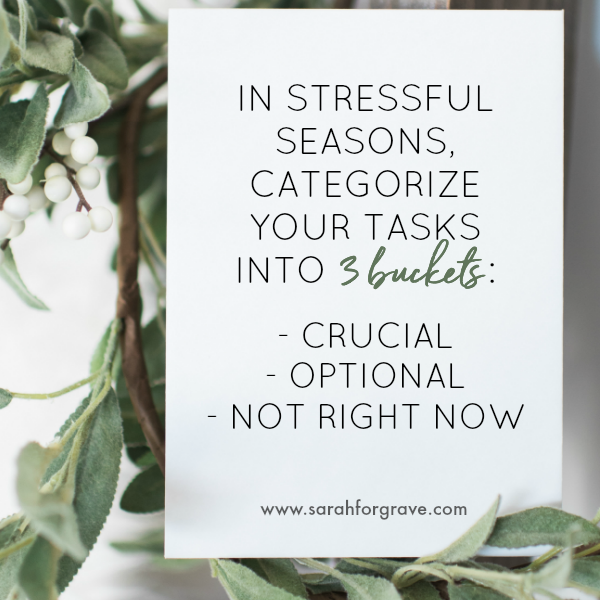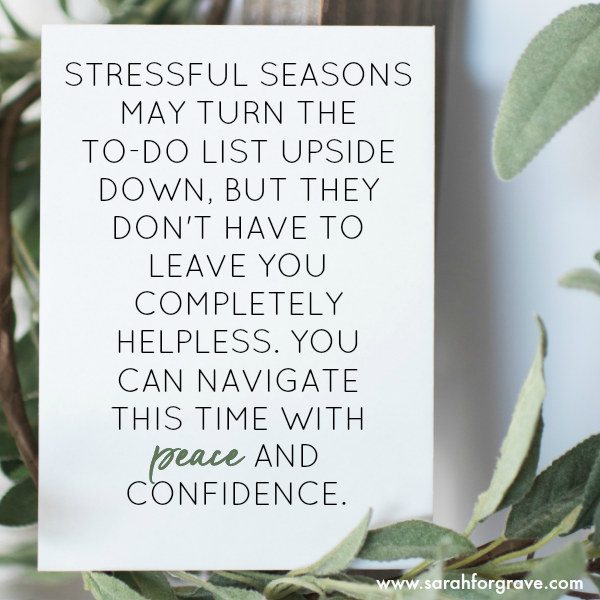I’m a to-do list addict. Anyone else with me? I love to track everything that needs to get done and then check off each item afterward.
I not only love to-do lists; I need them. Without a place to unload my brain, I would fail miserably at nearly everything. Tasks would languish, appointments would be forgotten, and friends would think I’ve lost my mind.
But, as much as I would love to control and manage my life indefinitely, there are seasons when everything gets turned upside down. Caregiving for a loved one, a family crisis, an intensified work schedule—all of these can make a to-do list downright laughable.
So what do you do when life throws a major turn of events at you, but you still have to get things done? There are four steps I’ve found helpful for navigating these seasons of life.
1. Write everything down.
If you haven’t already written all your to-dos down, take a minute to do that now. What are the “everyday life” items that need to get done, and what are the extra tasks caused by the season you’re facing?
2. Categorize each task.
Look at each task and place it in one of three categories:
- Crucial – It has to get done no matter what.
- Optional – It would be nice to get it done, but the world won’t fall apart if it doesn’t happen.
- Not Right Now – It isn’t pressing in any way and can wait until life settles back into a normal pattern.
Let’s look at an example. Say you’re caring for a spouse who just suffered a stroke and you’re reeling with questions of where to go from here.
- A Crucial task is keeping up with doctor’s orders and helping your spouse with physical therapy. No negotiation there.
- An Optional task might be planning a meal schedule for the next week. You would feel much better if you were able to do it, but you would survive either way.
- A Not Right Now task would be cleaning the ceiling fans and baseboards in your house. It may have been on your to-do list prior to your spouse’s health crisis, but life will go on without it.
3. Reach Out to Your Team
By “team,” I mean friends and family who are available and positioned to help. Are there any tasks that can be handled by someone else? Maybe a friend who could coordinate a meal delivery schedule for after your spouse comes home from the hospital? Or if the ceiling fans and baseboards are important to you, is there a housecleaner you can hire to help?
Mark these items accordingly and then make the proper contacts to get the ball rolling.
4. Do what you can, and show yourself grace.
Now that you’ve whittled down your tasks to the most important ones that only you can do, follow through. But always stay attuned to your physical, emotional, and spiritual health.
If your body is worn down, allow it to get the rest it needs. If your emotions are frayed, give yourself permission to “get away from it all” and do something relaxing and enjoyable. If your spirit is dry, the best thing to do is spend time with God. (My books, Prayers for Hope and Healing and Prayers of Hope for Caregivers, can help you with this.)
Once your body, emotions, and spirit are nurtured, all other tasks will fall into place.
Stressful seasons may turn the to-do list upside down, but they don’t have to leave you completely helpless. With a little analysis and a whole lot of grace, you can navigate this time with peace and confidence.
Hang in there, my friend.


